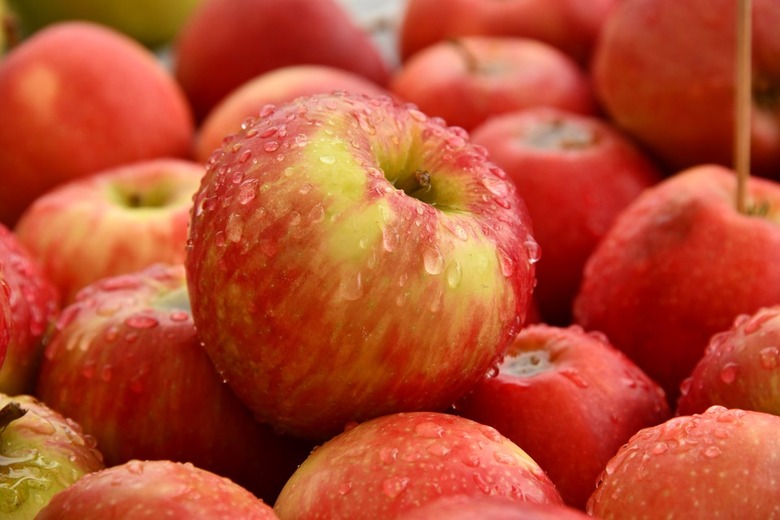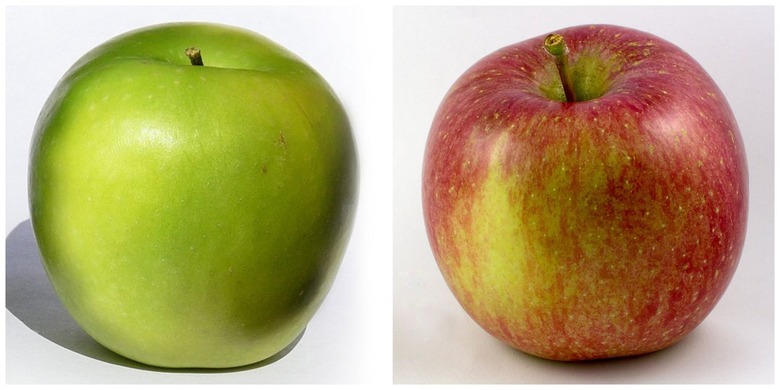How To Store Apples So You Always Get That Beautiful Bite
We may receive a commission on purchases made from links.
Mealy, bruised, wrinkly apples are hardly attractive, but they're even worse to eat. If your fruit ends up like this more often than not, then it's time you learn how to store apples properly to keep them fresh as long as possible. That's why we spoke with Michael Murphy, an emergency preparedness and food storage expert from Prep SOS, to find out the best way to store apples, whether whole, cut, frozen, or freeze-dried.
How to Store Apples in the Fridge
How to Store Apples in the Fridge
Should apples be refrigerated, or should they be left on the counter? While a bowl of fresh apples looks beautiful, the best way to store apples is in the refrigerator, where they can be kept nice and cool at a temperature between 32 and 40 degrees Fahrenheit. "The ideal humidity for storing apples is around 90%," Murphy tells Hunker, which means they should be stored "either in the crisper drawer or in a plastic bag with a few holes poked in it to allow for ventilation." He says this can help keep them fresh and reduce moisture buildup, which can contribute to spoilage.
The Best Temperature and Humidity for Storing Apples
|
Temperature |
Humidity |
|
Between 32 and 40 degrees Fahrenheit |
90% |
While you focus on how to keep apples fresh, don't forget about the other produce in your refrigerator as well. "Apples give off a gas called ethylene, which can cause other fruits and vegetables to ripen and spoil more quickly," explains Murphy. To prevent this problem, he recommends storing apples separately from other fruits and vegetables in a plastic bag with holes in it or in another type of container with ventilation, such as a produce storage container.
How to Store Cut Apples in the Fridge
How to Store Cut Apples in the Fridge
If you or your kids prefer munching on cut apples rather than eating around the core, you can store these slices in an airtight container in your refrigerator for three to five days. To prevent browning, sprinkle lemon juice on the slices or choose Opal apples, a non-GMO cultivar that does not turn brown. Murphy says it's time to discard your apple pieces if you notice "discoloration or dark spots on the slices, a slimy or sticky texture, and a sour or unpleasant smell."
Wondering which varieties are best to cut up for lunch packs? "Crisp, firm apples, like Honeycrisp, Granny Smith, and Braeburn, are good choices for slicing and storing," says Murphy.
How to Store Fresh-Picked Apples
How to Store Fresh-Picked Apples
Those who grow apple trees should learn how to keep apples fresh for as long as possible without filling their whole refrigerator with an entire tree full of apples. To maximize your apples' life span, "it's best to store them in a single layer so they don't touch each other, as this can cause them to spoil more quickly," Murphy says. "You can also wrap each apple in paper or place them in a paper bag to help absorb any excess moisture." The best place for storing fresh-picked apples from your tree is a cool, dark place with good ventilation, ideally at a temperature between 30 and 40 degrees Fahrenheit with a humidity level of around 90%.
The Best Temperature and Humidity for Fresh-Picked Apples
|
Temperature |
Humidity |
|
Between 30 and 40 degrees Fahrenheit |
90% |
As long as you have a cellar, basement, or garage with ideal storage conditions, Murphy says fresh-picked apples can last between one and three months depending on the cultivar. "Some varieties of apples, such as Honeycrisp, are more prone to spoilage and may not last as long as other varieties," he notes.
How Long Do Apples Last in the Fridge?
How Long Do Apples Last in the Fridge?
"Apples can last in the fridge for up to several weeks depending on the variety and how ripe they were when you bought them," says Murphy. On the other hand, apples left out on the counter only last for a few weeks depending on the cultivar and your home's temperature and humidity. "If it's very hot or humid, they may not last as long," he warns.
Which Type of Apple Lasts the Longest?
Which Type of Apple Lasts the Longest?
The science of storing apples can be complicated because some apples spoil quicker than others, and some are more sensitive to how they are stored. "Some varieties, like Granny Smith, can last for several months in the fridge," says Murphy, "while others, like Gala or Honeycrisp, may only last for a few weeks."
If you don't like storing apples in the refrigerator because you worry about their ethylene production or because you love the way they look, then opt for apples with thick skin since they last the longest out of the fridge.
Murphy says thick-skinned cultivars, like Granny Smith and Fuji, can last up to a few months on the counter, whereas "apples with thinner skin, such as the Gala, the Jonagold hybrid, and Suncrisps, may last at best two to three weeks sitting on the kitchen counter." However, regardless of how thick an apple's skin may be, it will still last the longest when stored in the refrigerator.
Even crab apples that you harvest are subject to the same storage rules as other apples, but Murphy says that "due to their higher acidity content, they may not last as long as other apple varieties." He recommends eating them within a few weeks so you can enjoy them while they're still fresh.
How to Pick the Best Apples at the Store
How to Pick the Best Apples at the Store
Maximizing your apple's life span in the fridge starts with buying fresh apples at the store. "First, inspect the skin of the apple to make sure there are no bruises or blemishes," says Murphy. "The skin should be smooth and free of any wrinkles or soft spots."
If the apple's skin looks good, check to ensure the stem is intact and not broken, as problems with the stem can indicate mold or bacterial growth inside the apple. "Finally, give the apple a gentle squeeze to make sure it's firm to the touch," he says. If it's soft or mushy, it's probably old.
How to Tell if an Apple Is Bad
How to Tell if an Apple Is Bad
"There are several signs that an apple has spoiled," Murphy explains. "Soft or mushy texture, brown or discolored spots, wrinkled or shriveled skin, an unpleasant smell, and mold growth are all indications that an apple has gone bad." To avoid food-borne illness and to prevent bad apples from spoiling your whole bunch, discard apples with any of these issues.
How to Tell When an Apple Is Ripe on the Tree
How to Tell When an Apple Is Ripe on the Tree
Before worrying about how to store apples long term in your cellar, though, you need to know when an apple on the tree is ready to be picked. Fruits picked too late are more prone to spoilage, while those harvested too early won't taste as good. Murphy says you can sometimes tell by the color, as ripe apples usually have a brighter, more vibrant color than unripe ones. Of course, he reminds growers that "different apple varieties have different colors when they're ripe, so it's important to know what color your specific variety should be."
When in doubt, try gently twisting the fruit. "If the apple comes off easily in your hand," he says, "it's likely ripe and ready to be harvested."
Can You Freeze Apples?
Can You Freeze Apples?
"Yes, you can freeze apples to use later," says Murphy. "However, they may become a bit mushy once thawed, so they're best used in recipes like pies or applesauce." Overall, firm, tart apples, like Granny Smith or Cortland, best maintain their taste and texture after freezing.
"To keep frozen apples tasting their best," Murphy says, "it's best to peel and slice them before freezing." He says that sprinkling the slices with lemon juice can help prevent browning. Lay the pieces flat on a baking sheet covered in parchment paper and then freeze for a few hours before transferring them to an airtight container or freezer bag.
Frozen apples can be stored for between eight months and a year.
How to freeze apples:
- Peel and slice the apples.
- Sprinkle the apple slices with lemon juice to prevent browning.
- Lay the apple slices on a baking sheet covered with parchment paper.
- Freeze the slices for a few hours.
- Transfer the apple slices to an airtight container or freezer-safe bag.
How to Store Apples Long Term
How to Store Apples Long Term
"If you have access to a food dehydrator," Murphy says, "you can extend the shelf life of apples up to six months and store them in your pantry." While the equipment is very expensive, you can keep your apples even longer with a freeze dryer. "You can freeze dry your apples, and they can last 15 or more years without refrigeration!" he says.

